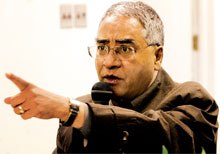 From one crude standard, at least, Nepalese politics does seem to be returning to normal. Sher Bahadur Deuba is once again being bashed for his royalist tendencies. News reports, ostensibly leaked by constituents of the Seven-Party Alliance (SPA), have blamed the Nepali Congress (Democratic) president for the delay in the parliamentary proclamation curtailing King Gyanendra’s powers.
From one crude standard, at least, Nepalese politics does seem to be returning to normal. Sher Bahadur Deuba is once again being bashed for his royalist tendencies. News reports, ostensibly leaked by constituents of the Seven-Party Alliance (SPA), have blamed the Nepali Congress (Democratic) president for the delay in the parliamentary proclamation curtailing King Gyanendra’s powers.Deuba had reportedly forwarded a proposal that would allow the monarch keep his post of the supreme commander of the RNA. From angry demonstrators on the streets to raging denizens of cyberspace, Deuba has enraged entire communities. The former premier was forced to reject what he called a campaign aimed at assassinating his character.
“This is grossly unfair to me,” Deuba told reporters. “I have repeatedly emphasized the need for a constituent assembly, changing the current national anthem, renaming ‘His Majesty’s Government ‘Nepal Government’ and bringing the army under the Parliament. Why should I support the King when he has repeatedly victimized me?”
The latest phase of Operation Demolish Deuba began the day he was freed from detention by a Supreme Court order. The more Congressi-than-the-Koiralas camp in the parent party was quick to draw comparisons. B.P. Koirala, Nepal's first elected premier, walked out of prison in 1968 after pledging to cooperate with King Mahendra, the man who had ousted him eight years earlier. (Of course, B.P. didn't have to actually demonstrate his fealty to the partyless Panchayat system because he slipped into
exile in India.) Deuba walked free on his own terms.
The anti-Deuba coterie in the Nepali Congress has had a long list of grievances against the man. This group hasn’t been able to forgive Deuba for becoming Nepal’s first prime minister who studied in the West. (The London School of Economics, to be precise.) Almost every time this fact is brought up, angry critics emerge to assert that Deuba was too preoccupied with more menial responsibilities in and around London to have visited the LSE more than a couple of times. The LSE didn’t see things that way, considering the reception it held for Deuba during his first stint as premier.
Then Deuba’s proximity to a former American ambassador is brought up. If the ambassador was good enough to facilitate the return of multiparty democracy in 1990 then there’s no reason why she shouldn’t have served as Deuba’s marriage facilitator – if indeed that was she had done.
If Deuba is in favor of boosting Nepal’s relations with the world’s only hyperpower, he is just representing a generational shift in a party that sees the world beyond the Hindi-speaking belt of northern India. Deuba shouldn’t have to apologize for that; in fact, he should bring in more people like Dr. Minendra Rijal and Dr. Prakash Sharan Mahat.
Deuba is castigated for having imported the “Pajero Culture” into Nepal. But his critics won’t explain that Deuba had to lead the country’s first parliamentary coalition where every MP felt entitled to his or her pound of flesh. And, worse still, most of his strongest critics on this count today are people who imported those gas guzzlers.
Deuba’s meeting with US President George W. Bush in the Oval Office and his leadership of the SAARC summit during his second premiership were too much for his party rivals to bear. King Gyanendra may or may not have instigated Deuba to dissolve the House of Representatives in May 2003. If anything pushed Deuba to break away from the Koirala Congress and veer toward the palace, it was the coterie’s incessant subversion. Ram Chandra Poudel, who decided at the last minute not to join Deuba’s Congress as president, at one point insisted that you couldn’t blame a heavily cornered cat for jumping out the first window it found.
In accepting the third premiership, Deuba was taking a serious risk. A second sacking in as many years was bad enough. It was a travesty of royal justice to see Deuba jailed for corruption in a deal the principal donor agency considered clean, while all those certifiable sleazebags got to reinvent themselves as the greatest democrats on the streets of Kathmandu. And let’s not forget that Deuba was virtually dragged from home in the middle of the night to face trumped-up charges.
To understand Deuba’s strenuous denial of having backed King Gyanendra at the SPA meeting, you must go back to the first few interviews he gave after his release earlier this year. He thanked the United States, along with India and European nations, for their consistent pressure on King Gyanendra’s regime. He was forceful in projecting the ambiguities in the 12-point SPA-Maoist accord.
The most significant portions of Deuba’s post-freedom interviews were his tributes to the selfless service of the military. As someone who once made peace with the Maoists and also barely survived an assassination attempt mounted by the rebels, Deuba recognizes more than anyone else the perils of politically-inspired efforts to weaken the command and control structure. If he had indeed forwarded a proposal that would allow the monarch keep his post of the supreme commander of the RNA, maybe he was being pro-military.